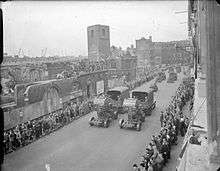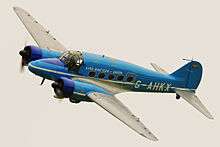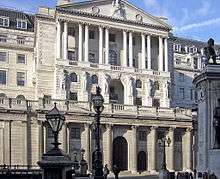1946 in the United Kingdom
| |
| Other years |
| 1944 | 1945 | 1946 | 1947 | 1948 |
| Individual countries of the United Kingdom |
| England | Northern Ireland | Scotland | Wales |
| Sport, Television and music |
Events from the year 1946 in the United Kingdom.

Searchlights at London Victory Parade, June 1946

1946 Avro Anson, now in the Shuttleworth Collection, 2013 photo.
Incumbents
- Monarch - George VI
- Prime Minister - Clement Attlee (Labour)
Events

The Bank of England's head office at Threadneedle Street, in the City of London.
- 1 January
- The first international flight from London Heathrow Airport, to Buenos Aires.
- Atomic Energy Research Establishment established at Harwell, near Oxford.
- 10 January - First United Nations General Assembly convenes at Methodist Central Hall Westminster.
- 17 January - The United Nations Security Council holds its first meeting at Church House in London.
- 14 February - The Bank of England is nationalised.
- 15 February - American dance craze, the Jitterbug, sweeps Britain.[1]
- 20 February - Royal Opera House in Covent Garden re-opens after the War[2] with The Royal Ballet (relocated from Sadler's Wells Theatre) performing The Sleeping Beauty.
- 5 March - Winston Churchill delivers his "Iron Curtain" speech at Westminster College in Fulton, Missouri, United States.[3]
- 9 March - Stadium disaster at Bolton Wanderers's Burnden Park, Bolton, England: 33 killed and hundreds injured.
- 10 March - British troops begin withdrawal from Lebanon.
- 15 March - Labour Prime Minister Clement Attlee announces that Britain is granting India's wish for independence.
- 24 March - BBC Home Service radio broadcasts Alistair Cooke's first American Letter. As Letter from America, this programme will continue until a few weeks before Cooke's death in 2004.
- 27 April - The first postwar FA Cup final is won by Derby County, who beat Charlton Athletic 4-1 at Wembley Stadium.[4]
- 4 May - First-class cricket returns, having been suspended during the War.[2]
- 20 May - The House of Commons votes to nationalise coal mines in the United Kingdom.
- 23 May - Terence Rattigan's drama The Winslow Boy premieres in London.[5]
- 31 May - London Heathrow Airport opened fully for civilian use.[1]
- 1 June - Television licence introduced.[3]
- 7 June - Television broadcasting by the BBC, suspended during World War II, resumes.[1]
- 8 June - A victory parade is held in London to celebrate the end of World War II.[6]
- 27 June - Government imposes bread rationing.[7]
- July - Homeless families squat in a former Army camp at Scunthorpe.[8]
- August - Arthur Horner, a member of the Communist Party, becomes General Secretary of the National Union of Mineworkers.
- 1 August - Finance Act receives Royal Assent,[9] including the establishment of the National Land Fund to secure culturally significant property for the nation as a memorial to the dead of World War II.[10]
- 6 August
- Family allowance introduced, a cash benefit paid to mothers.
- Free milk (⅓ pint daily) provided in UK state schools to all pupils under the age of 18.
- 9 August - Arts Council incorporated by Royal Charter.[2]
- 31 August - League football returns, having been suspended during World War II.[2]
- September–November - Britain Can Make It exhibition at the Victoria and Albert Museum in London, promoted by the Council of Industrial Design and the Board of Trade to show off good domestic and industrial design.[11]
- 8 September - Mass squat by homeless families of empty properties in London organised by the Communist Party.[8]
- 15 September - Marshal of the Royal Air Force Sir Arthur Harris, Commander-in-Chief of RAF Bomber Command, retires.
- 16 September - Popular quiz show Have a Go! with Wilfred Pickles first broadcast nationally on BBC Radio.[7]
- 29 September - BBC Third Programme begins broadcasting.[1]
- 1 October - English premiere of J. B. Priestley's drama An Inspector Calls at the New Theatre, London, starring Ralph Richardson.[12]
- 7 October - The BBC Light Programme transmits the first episode of the daily radio magazine programme Woman's Hour (initially presented by Alan Ivimey), which will still be running more than 65 years later, and of the daily adventure serial Dick Barton - Special Agent.
- 1 November - First Royal Command Performance at a public cinema, the Empire, Leicester Square: premiere of the Powell and Pressburger film A Matter of Life and Death starring David Niven.[13]
- 9 November - Shooting of Margaret Cook in Carnaby Street, London.
- 10 November - Peter Scott opens the Slimbridge Wetland Reserve in Gloucestershire.
- 11 November - Stevenage, a village in Hertfordshire, is designated by the Attlee government as Britain's first new town to relieve overcrowding and replace bombed homes in London. The new town is set to have around 60,000 residents once it is completed, and the first homes are expected to be ready by 1952 and the town fully developed by the early 1960s. The town's centerpiece will be a revolutionary pedestrianised central shopping area.[14]
- 17 November - Eight British Army servicemen are killed in Jerusalem by Jewish terrorists.
- 22 November - Tony Benn is elected as Treasurer of the Oxford Union.
- 29 November
- Premiere of educational documentary film The Instruments of the Orchestra containing Benjamin Britten's composition The Young Person's Guide to the Orchestra.
- BBC Television premieres Pinwright's Progress, the world's first regular half-hour situation comedy.[15]
- 26 December - David Lean's film of Great Expectations released.
Undated
- Cinemagoing reaches an all-time peak, with 1,635 million admissions during the year.[7]
- Lifting of prohibition on married women working in the Civil Service.[7]
- Fred Pontin opens the first Pontins holiday camp, at Brean Sands, Burnham-on-Sea, Somerset.
- The University of Bristol establishes the first university drama department in the UK.[16]
- Bush DAC90 bakelite radio introduced: it becomes the best-selling model for some years.[11]
Publications
- January - Launch of Penguin Classics under the editorship of E. V. Rieu, whose translation of the Odyssey is the first published in the series[17] and will be the country's best-selling book over the next decade.[18]
- W. V. Awdry's children's book Thomas the Tank Engine.
- Agatha Christie's Hercule Poirot novel The Hollow.
- R. G. Collingwood's collected philosophical lectures The Idea of History (posthumous).
- John Stewart Collis' memoir While Following the Plough.
- Stella Gibbons' novel Westwood.
- Philip Larkin's novel Jill.
- George Mikes' book How to be an Alien.
- Mervyn Peake's novel Titus Groan, first of the Gormenghast series.
- Thomas Sharp's book The Anatomy of the Village.
- Joint Committee of the Building Research Board and the Fire Offices' Committee's first report on fire safety General Principles and Structural Precautions.[19]
Births
January - February
- 3 January - John Paul Jones, English bassist (Led Zeppelin)
- 6 January - Syd Barrett, English guitarist and singer (Pink Floyd) (died 2006)
- 14 January - Harold Shipman, British serial killer (died 2004)
- 19 January - Julian Barnes, novelist
- 25 January - Pete Price, Merseyside radio disc jockey
- 7 February - Pete Postlethwaite, actor (died 2011)
- 9 February - Séan Neeson, Alliance Party of Northern Ireland politician
- 13 February - Colin Matthews, British composer
- 15 February - Clare Short, politician
- 16 February - Ian Lavender, actor
- 20 February - Brenda Blethyn, English actress
- 21 February - Alan Rickman, English actor (died 2016)
- 28 February - Robin Cook, British Labour politician (died 2005)
March - April
- 6 March - David Gilmour, English musician (Pink Floyd)
- 21 March - Timothy Dalton, actor
- 25 March - Cliff Balsam, English footballer
- 2 April - Sue Townsend, English comic novelist and playwright (died 2014)
- 4 April - Dave Hill, English guitarist (Slade)
- 9 April - Les Gray, English vocalist (Mud)
- 12 April - George Robertson, Scottish politician
- 19 April - Tim Curry, actor, vocalist and composer
- 24 April - Piers Gough, architect
- 25 April - John Fox, statistician
- 28 April - Linda Knowles, high jumper
May - June
- 1 May - Joanna Lumley, actress
- 4 May - John Watson, Northern Irish racecar driver
- 10 May
- Donovan, Scottish musician
- Maureen Lipman, actress, columnist and comedian
- Dave Mason, English musician (Traffic)
- 11 May - David Varney, English civil servant
- 16 May - Robert Fripp, British musician
- 22 May - George Best, Northern Irish footballer (died 2005)
- 2 June - Peter Sutcliffe, English serial killer
- 15 June - Noddy Holder, English singer (Slade)
- 23 June - Kathy Wilkes, English philosopher
- 28 June - Jamie Cann, politician (died 2001)
July - August
- 3 August - Jack Straw, British politician
- 6 August - Ron Davies, politician
- 23 August - Keith Moon, English drummer (The Who) (died 1978)
- 26 August - Alison Steadman, actress
September - October
- 1 September - Barry Gibb, musician
- 10 September - Don Powell, English drummer
- 11 September - Mike Bull, Northern Irish pole vaulter and decathlete
- 25 September - Felicity Kendal, actress
- 8 October - Bel Mooney, English author, journalist, advice columnist
- 10 October - Charles Dance, actor
- 13 October - Edwina Currie, British Conservative politician, author and radio personality
- 14 October - Justin Hayward, English singer and songwriter (Moody Blues)
- 17 October - Vicki Hodge, English actress
- 19 October - Philip Pullman, English author
- 22 October - Eileen Gordon, British Labour politician
- 31 October
- Caroline Jackson, British politician
- Stephen Rea, Northern Irish actor
November - December
- 1 November - Ric Grech, British bassist (Family, Blind Faith, Traffic (died 1990))
- 6 November - Susie Orbach, English psychotherapist
- 7 November - Martin Barre, English musician (Jethro Tull)
- 12 November - P. P. Arnold, born Patricia Ann Cole, American-born soul singer
- 14 November - Carola Dunn, English writer
- 15 November - Gwyneth Powell, British actress
- 18 November - Andrea Allan, Scottish actress
- 21 November - Marina Warner, English writer
- 23 November - Diana Quick, English actress
- 4 December - Angela Browning, English Conservative politician and MP for Tiverton and Honiton
- 14 December - Jane Birkin, English actress and singer
- 16 December - Trevor Pinnock, English harpsichordist and conductor
- 17 December - Bel Mooney, English broadcast journalist
- 20 December - Lesley Judd, English actress and television presenter
- 25 December - Christopher Frayling, English cultural historian
- 27 December
- Janet Street Porter, English broadcast journalist
- Polly Toynbee, English journalist and writer
- 29 December - Marianne Faithfull, English singer and actress
Deaths
- 3 January - William Joyce, Irish American fascist propagandist (born 1906) (hanged at Wandsworth Prison for treason)
- 4 January - Theodore Schurch, British-born soldier and collaborator (born 1918) (hanged at Pentonville Prison for treachery)
- 5 February - George Arliss, English actor (born 1868)
- 3 April - Alf Common, English footballer (born 1880)
- 21 April - John Maynard Keynes, economist (born 1883)
- 14 June - John Logie Baird, Scottish television pioneer (born 1888)
- 11 July - Paul Nash, artist (born 1889)
- 15 July - Razor Smith, English cricketer (born 1877)
- 13 August - H. G. Wells, English novelist (born 1866)
- 16 August - Granville Bantock, classical composer and conductor (born 1868)
- 31 August - Harley Granville-Barker, actor, playwright and critic (born 1877)
References
- 1 2 3 4 "The Lost Decade Timeline, BBC". Archived from the original on 21 August 2006. Retrieved 2008-01-29.
- 1 2 3 4 Palmer, Alan; Veronica (1992). The Chronology of British History. London: Century Ltd. pp. 395–396. ISBN 0-7126-5616-2.
- 1 2 Penguin Pocket On This Day. Penguin Reference Library. 2006. ISBN 0-14-102715-0.
- ↑
- ↑ "Plays". Terence Rattigan. Retrieved 2010-07-16.
- ↑ "Victory Celebrations, 8th June 1946 by Ron Goldstein, BBC website". Retrieved 2008-01-29.
- 1 2 3 4 Kynaston, David (2007). Austerity Britain 1945-1951. London: Bloomsbury. ISBN 978-0-7475-7985-4.
- 1 2 Marr, Andrew (2007). A History of Modern Britain. London: Macmillan. pp. 71–2. ISBN 978-1-4050-0538-8.
- ↑ "Finance Act 1946". 1 August 1946. Retrieved 18 March 2011.
- ↑ "Finance Act 1946 - 48 The National Land Fund". 1 August 1946. Retrieved 18 March 2011.
- 1 2 Evans, Paul; Doyle, Peter (2009). The 1940s Home. Oxford: Shire Publications. ISBN 978-0-7478-0736-0.
- ↑ Ellis, Samantha (7 May 2003). "JB Priestley's An Inspector Calls, October 1946". The Guardian. Retrieved 2011-07-18.
- ↑ Robertson, Patrick (1974). The Shell Book of Firsts. London: Ebury Press. p. 158. ISBN 0-7181-1279-2.
- ↑
- ↑ Lewisohn, Mark (2003). Radio Times Guide to TV Comedy. BBC Worldwide Ltd.
- ↑ "Bristol University History". History of the University. University of Bristol. Archived from the original on 16 June 2007. Retrieved 2007-05-13.
- ↑ "Penguin Classics in translation". Penguin Archive Project. University of Bristol. 17 August 2009. Retrieved 2011-08-21.
- ↑ Sutherland, John (24 January 2005). "Pick up a Penguin?". The Guardian. p. 5.
- ↑ "History of Fire Safety". FireNet. 2009. Archived from the original on 2010-12-15. Retrieved 2011-01-19.
| Wikimedia Commons has media related to 1946 in the United Kingdom. |
See also
External links
This article is issued from Wikipedia - version of the 11/17/2016. The text is available under the Creative Commons Attribution/Share Alike but additional terms may apply for the media files.